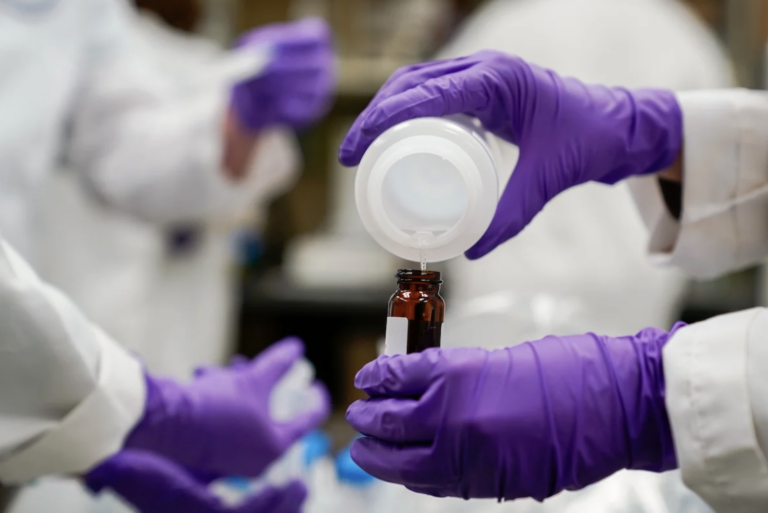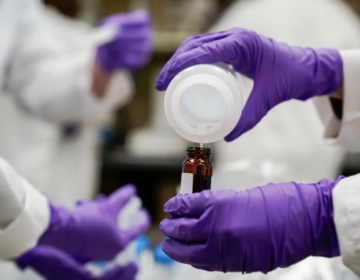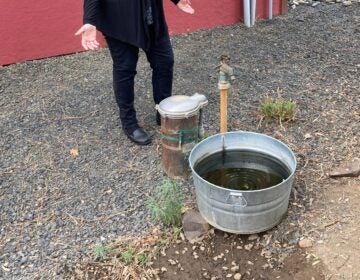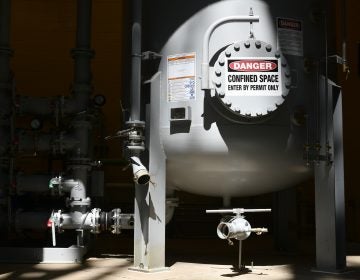Attorneys plan to sue Del. company under federal environmental act
Gore, known for the Gore-Tex fabric, is accused of improperly disposing of hazardous waste into sewers and the air.

A water researcher pours a water sample into a smaller glass container for experimentation as part of drinking water and PFAS research at the U.S. Environmental Protection Agency Center for Environmental Solutions and Emergency Response, Thursday, Feb. 16, 2023. (AP Photo/Joshua A. Bickel)
From Philly and the Pa. suburbs to South Jersey and Delaware, what would you like WHYY News to cover? Let us know!
The company Gore, best known for Gore-Tex fabric, continues to face legal troubles for allegedly polluting the environment with the toxic class of chemicals called PFAS, which made its way into drinking water.
Attorneys representing residents in Elkton, Maryland, sent a notice of their intent to sue on Wednesday, alleging the company, headquartered in Newark, Delaware, violated federal environmental laws.
The notice follows a separate class-action lawsuit filed by the same attorneys last year, which accuses Gore of contaminating residents’ drinking water with so-called “forever chemicals” from its Cherry Hill plant in Elkton.
“PFAS is known to cause cancer and other diseases. We believe that there is a cancer cluster, and really a disease cluster [near the plant],” said Phil Federico of Baird Mandalas Brockstedt & Federico. “We certainly have clients who have developed cancers and other diseases that are causally related to the PFAS-contaminated water they’ve been drinking for decades.”
Federico said since last year, his team has uncovered additional documents indicating the extent of contamination allegedly caused by Gore is much greater than previously thought. He said two of the company’s other Elkton plants — Fair Hill and Appleton South — also allegedly poisoned wells.
Gore denies the allegations outlined in the intent to sue notice.
“[The allegations] do not accurately reflect our strong legacy of taking proactive steps to process [PFAS chemicals] responsibly, striving always to minimize any potential environmental impact from our operations,” the company said in a statement to WHYY News.
Gore said it also has been working with the Maryland Department of the Environment to conduct an environmental assessment. The company announced in 2014 it eliminated certain PFAS chemicals from its manufacturing processes.
PFAS chemicals have tainted the water, air and soil across the country for decades. The chemicals are widely used in consumer products, such as nonstick cookware, waterproof clothing and some food packaging, as well as in firefighting foam.
The consequences of exposure to PFAS are long-lasting — the compounds can stay in the environment, and the human bloodstream, for years. The chemicals have been linked to some cancers, thyroid disease, ulcerative colitis, developmental delays in children and other health conditions.
The notice of intent to sue accuses Gore of disposing contaminated wastewater into the sewer system, while aware of the potential threat it posed to drinking water supplies. Attorneys also say chemicals escaped the plant into the air, which made its way into streams and groundwater.
Attorneys plan to sue Gore under the federal Resource Conservation and Recovery Act, which would compel the U.S. Environmental Protection Agency to force the company to remediate PFAS contamination.
The letter comes five months after the EPA designated PFAS chemicals as hazardous substances under the federal superfund law. Federico said he believes the decision puts his team in a better position to take federal action against Gore.
The separate civil class action lawsuit filed last year alleged Gore executives understood the dangers of PFAS since at least the early 1990s. Despite this knowledge, Gore allegedly dumped large quantities of contaminated wastewater into groundwater that supplies drinking water in wells, and into the public sewage system.
Plaintiffs, who say they have serious health conditions, report their drinking water contained PFAS as high as 710 parts per trillion for one type of forever chemical — more than 100 times above new federal limits.
The class action lawsuit will be amended to include Gore’s two other Elkton plants. As many as eight to 10,000 residents might be eligible for the suit, Federico said.
Plaintiffs under the civil suit seek monetary compensation for reduced property values, to fund medical monitoring and to connect residents to an alternative drinking water supply.
“People that live there, who can’t just pull up and move, have to take precautions to make sure that they’re no longer drinking contaminated water,” Federico said. “They have to put filters in, they have to drink bottled water. And, there will be an effort to get many of them on public water that we know is safe.”
The lawsuit is one of many filed against companies that make the products, such as DuPont and its successor companies, and 3M.

Get daily updates from WHYY News!
WHYY is your source for fact-based, in-depth journalism and information. As a nonprofit organization, we rely on financial support from readers like you. Please give today.







